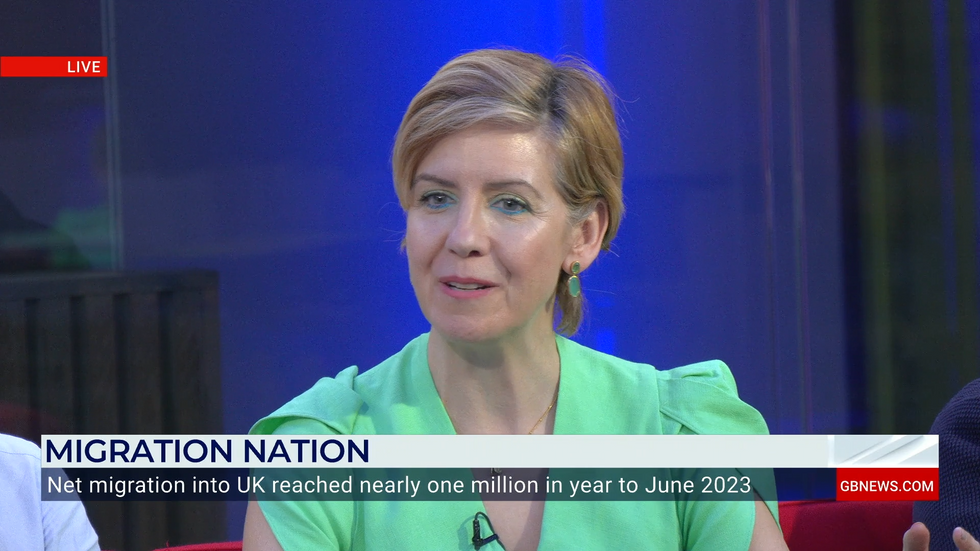I dared to question Reform. What happened next showed the party needs to evolve - Miriam Cates
Miriam Cates worried about Reform
OPINION - Miriam Cates was Conservative MP for Penistone and Stocksbridge from 2019 to 2024 and is now a GB News presenter.
Don't Miss
Most Read
Trending on GB News
Well, I didn’t see that coming! In my GB News column last week, I wrote about the extraordinary success of Reform UK, as the insurgent party drew level with Labour and the Tories in the polls for the first time.
I remarked on the threat this poses to both establishment parties but observed that there challenges remain ahead for Reform if they are to move from the margins to a serious contender for government.
These challenges, I suggested, include the need to define a coherent philosophical framework and a more detailed policy platform beyond Reform’s current well-established stance on immigration and Net Zero.
I also raised the need to clarify the Party’s relationship with the world’s richest man, Elon Musk, and any potential conflicts of interest.
To my mind, these are legitimate questions that any political party seeking power should be able to answer.
Yet senior members of Reform responded to my article not with measured answers or attempts to explain, but with personal attack.
Andrea Jenkyns claimed that I am “part of the problem”. Richard Tice asked if I am a “real Conservative or a soggy one?” Zia Yousuf inexplicably claimed my questions amounted to a “bad faith” “tirade.”
Of course, Tice and the others are free to say whatever they want on social media, and their reactions were nothing if not revealing.
But the style and the substance of the response to a fair and measured article published by GB News does raise questions about the readiness of Reform to move from party of protest to serious contender for government.
 Andrea Jenkyns explained her decision to join Reform on GB News GB NEWS
Andrea Jenkyns explained her decision to join Reform on GB News GB NEWSOn the style of the response, the instinct was clearly to play the man not the ball, to characterise me as a ‘soft Tory’ acting in ‘bad faith’ and who has no right to ‘lecture’ them.
This is a bizarre characterisation—I am well known to be hugely sympathetic to Reform and have very similar political views on a range of issues. As a backbench Conservative MP, I frequently challenged and even opposed my own government on the issues that matter to the Reform Party.
I was one of 38 MPs to vote against Zero Emission Vehicle targets, the dreadful legislation that will ban the sale of petrol and diesel cars. I was one of just eleven Conservative MPs to vote against the Rwanda Bill—at risk of losing the whip—because it did not contain a commitment to disregard the ECHR.
(In contrast, Lee Anderson, then a Conservative MP, voted with the government for the Net Zero measures and did not vote on the Rwanda Bill). In Parliament, I led the campaign to reopen schools after lockdown, and against the teaching of gender ideology.
I exposed the appalling nature of what was being taught to children under the guise of ‘relationships education’ and secured a review of sex education in schools.
While I am not a member of Reform, I am hardly a closet lefty. If the first response of Reform’s key players to questions from a fellow traveller is personal attack, how will they respond to scrutiny from their political opponents?
And even if I was an open borders liberal, would that make my questions any less valid or worthy of consideration?
The style of the response was disappointing, but the substance sadly even more so. Tice claimed that “Reform’s philosophy is common sense and courage”.
These are both admirable attitudes but neither are philosophies. I am no clearer on whether a Reform government would take a Thatcherite libertarian economic approach or a Trumpian post-liberal pro-nation one.
Is Reform a socially and culturally conservative party or one that supports progressive liberal causes, such as the push for assisted suicide?
During the election Farage hit out at Keir Starmer and Rishi Sunak, who he called “socialist twins”. Yet the Reform manifesto’s commitment to take seven million people out of paying tax altogether is socialism on steroids—those who make no contribution to our public services have every incentive to vote for parties that promise to spend more of other peoples’ money!
In my article, I remarked that Reform MPs have admirably taken a stand against “wokism” and asked whether the Party intends to repeal the Equality Act 2010, the Gender Recognition Act and the Human Rights Act if they gain power.
In his attack on me, Zia Yousuf claimed that I had ‘not done my research’ and that the answers to my questions lay in the Reform Manifesto. But Yousef is incorrect.
The manifesto makes no mention of the Gender Recognition Act or the Human Rights Act. It does say that Reform would replace (not repeal) the ‘Equalities Act’ (I assume this is a typographical error as there is no ‘Equalities Act,’ a small but important mistake).
But replace it with what? And, while no one is expecting Reform or any other opposition party to have a fully developed legislative programme for government four years out from an election, it is nevertheless still legitimate for journalists and voters to ask for more detail on how Reform intends to tackle institutional leftism, a key issue for many of their supporters.
 Richard Tice convinced Lee Anderson to join the insurgent party X / RICHARD TICE
Richard Tice convinced Lee Anderson to join the insurgent party X / RICHARD TICEThe one question that none of the key players attempted to answer was over Reform’s relationship to Elon Musk.
While I have enormous respect and admiration for Musk—surely the greatest innovator of our generation—there are good reasons why it is illegal for British political parties to accept foreign donations.
If we want Britain to be a sovereign nation, then the loyalties of our elected politicians and prime ministers must lie with Britain and the British people.
Any politician who is beholden—or has the appearance of being beholden—to a foreign business or individual is compromised. Despite Elon Musk’s admirable commitment to free speech and economic growth, any UK political party funded by him would have substantial conflicts of interests.
Under British law, Twitter/X will soon have to ensure that children cannot see the enormous amount of vile pornography on its platform, and the company will be—rightly—fined and prosecuted if it fails to comply.
These regulations were, predictably, strongly opposed by the tech industry. Would a Musk-owned Reform feel compelled to campaign against putting age restrictions on social media?
The Musk-owned Tesla electric car company is currently benefiting from UK Net Zero vehicle mandate—would a Farage-led government be willing to repeal this legislation?
Musk is not only a super-rich businessman, he is now a senior member of the US government. While the UK is a close ally of the US, we are not—and don’t want to be—a vassal state.
For a UK government to be indebted to a senior US government official would erode British independence and sovereignty at the highest level.
LATEST MEMBERSHIP OPINION:
 Nigel Farage met with Elon Musk in the US STUART MITCHELL
Nigel Farage met with Elon Musk in the US STUART MITCHELLSpeaking about the donations of George Soros to UK campaigns in 2018, Richard Tice said “he doesn’t live here, he doesn’t pay taxes here. What right has he got to interfere with our democracy?”
Well said Richard. Yet the only Reform response to my concerns regarding Musk was from Lee Anderson MP who, speaking to GB News’ Martin Daubney and Chris Hope last week claimed that I was raising concerns about Musk because of “sour grapes” since “I won and she lost”.
Lee's comments might make good TV, but it does nothing to address legitimate concerns about the influence of a man whose libertarian, transhumanist vision of the future makes many Brits deeply uncomfortable.
I offer this challenge to Reform as a critical friend. Like in Western Europe and the US, Britain’s establishment parties have failed us over the last forty years.
The careless attitude of our elites to immigration, public debt and the value of our culture and heritage has left us in desperate need of change.
I am a sincere admirer of Nigel Farage and, as someone committed to Britain and our democracy, I welcome the disruption to decades of damaging liberal hegemony.
Reform’s stance on immigration—and the fact of not being the Tories or Labour—will be enough for the insurgent party to climb higher in the polls.
Who knows, it might even be enough to win an election. But it will not be sufficient to govern well and to successfully implement the radical change that so many want to see.
That will require better defined philosophical foundations and a more detailed and consistent policy platform. And a slightly thicker skin.







